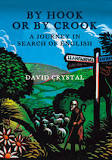 Here’s your experiment. You travel towards a new planet knowing that, of the two races, one is friendly towards humans and the other very angry. Which is the friendly one, the Lamonians or the Gataks?
Here’s your experiment. You travel towards a new planet knowing that, of the two races, one is friendly towards humans and the other very angry. Which is the friendly one, the Lamonians or the Gataks?
If you have an answer, then you are a linguist. Congratulations and welcome. The experiment is from David Crystal, a man who gets paid his love of words. By Hook or by Crook is his idiosyncratic linguistic journey, searching – as the subtitle tells us – for English. He doesn’t really find it, but how could you? English is far too big and far too interesting to bottle up, and Crystal know this. He’s already written two encyclopaedias on English, after all.
A more apt subtitle would probably mention a journey to look down some of the darkened corridors of English. Crystal is endlessly fascinated with language and words and speech patterns and local dialect and people and change and history and … well, anything.
The book is based loosely on a journey around Wales and southern England. Crystal was recording varied voices for a BBC series (called ‘Voices’ – what a surprise). As he travels and writes, his mind also wanders. To take one chapter, ‘Stratford’ includes thoughts on taboo words for sailors and actors, pub names, absent-minded professors, word-sound associations, cathedrals, cultural diversity, place names in the US and understanding Shakespeare’s plays.
Crystal is well aware of his wandering habit. He describes the internet as having many properties of spoken language: ‘loosely constructed sentences and unexpected changes of direction. A bit like this book, really …’
And it’s a good fun read. You’ll be surprised, informed and quite possibly keen to pursue word studies of your own. (Can you think of another place name with Roman numerals in the middle, to add to Ruyton XI Towns?)
As a Christian, I’m all for language because I’m all for the Word. I admit, though, that I am not thankful enough for the benefits of English in sharing the gospel of Jesus.
The English Bible, particularly the Authorised Version, has had huge impact on our language. In Anglican circles, the Book of Common Prayer is also an enduring legacy. BCP was not merely a way to run church. It is packed full of teaching about Jesus in phrases that stick. Independent churches don’t have prayer books. But I know what will happen if I visit an aged care home and start, ‘Our Father which art in heaven …’
It’s not that English is God’s language. It’s more like Paul using Roman roads, or the reformers using new printing technology. God’s eternal gospel is not too proud to hitch-hike a ride with what’s going on in our (transient) cultures.
You won’t find this kind of reflection on language in By Hook or by Crook. It is wide: the UK, USA, Canada, India, Australia, South Africa. It is long: going back to Old Norse, Latin, Anglo-Saxon and more. But it is not deep. It does not ask why words are so powerful, how they effect so much and what is the truth that lies beneath all speech.
I can’t say this is a failing. This is an enjoyable ramble. If your mind wants to wander, you can investigate deeper thoughts on your own time.
In that spirit, here’s a modified experiment for you. This time you aren’t going to a new planet, but into your local community. How do you think these people respond to the following words: Jesus, Christian, St Blogg’s by the Road? Or even – and there’s risk here – to hearing your name?
If enough of us listen like linguists to these opinions, we’ll be better able to point our neighbours to the God who has spoken clearly. It’s only in God himself that one of Crystal’s greatest desires will come to be – the preservation of all the world’s languages. What a day that will be! When all tribes and peoples and languages will cry out, ‘Salvation belongs to our God, and the the Lamb’ (Revelation 7:9-10).
